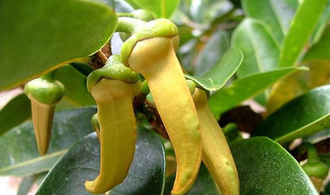IOC and IUCN: working together to preserve natural resources
Written by Modified on the
The Indian Ocean Commission (IOC) and the International Union for the Conservation of Nature (IUCN) are teaming up to stem the loss of island natural resources and to wage war against the introduction and spread of invasive alien species.
Aside from human destruction of natural habitats, invasive alien species are the most important cause of species extinction in the world, and perhaps the most important in our islands. Island ecosystems are more vulnerable to invasive species than continental ecosystems. A collective effort is needed to fight this threat.
Thanks to an EU grant, the IUCN is implementing a 5-year project entitled "Developmentof an integrated model for the management and dispersal of invasive alien species (IAS) in island ecosystems". This project, which will focus on Caribbean, Pacific and Indian Ocean islands, aims to improve quality of life for islanders and preserve their natural heritage by reducing the impact of invasive species on their biodiversity and the economic activities that depend on them.
The aims of the project are:
- Improvement of knowledge, awareness and expertise in the prevention and management of biological invasions in the islands
- Development of partnerships, establishment and strengthening of collaborations against biological invasions
- Prevention and management of biological invasions in Indian Ocean pilot sites to identify the most effective techniques
- Improving national, regional and global policy as well as the implementation of initiatives to better prevent and manage biological invasions.
Ultimately, all of these activities will create a universal model which can be systematically applied to each island, while taking into account each specific bio-climate, especially in tropical regions where there is still much to do. Subsequently, the formation of a regional protection center against invasive species will foster good practices while protecting initiatives. This center will build on existing measures and will work in partnership with regional institutions.
The IUCN will work closely with the IOC to implement this project in the Indian Ocean. The IOC is hosting this project with the plan of developing regional cooperation and enhancing coordination between agencies and projects working on these issues. This collaboration will enable both institutions to share their knowledge and skills and thus help people to conserve the natural resources on which they depend.
Created in1982 in Port-Louis (Mauritius) and institutionalized in 1984 by the General Agreement of Victoria (Seychelles), the Indian Ocean Commission (IOC) is an organization of five Member States (Comoros, France/Reunion, Madagascar, Mauritius and the Seychelles). The IOC’s vocation is to strengthen the ties of friendship and solidarity between islands and undertake regional cooperation projects designed to protect and improve their lives and conserve natural resources on which the islands depend. It is the only African regional organization composed entirely of islands, and it represents their interests on the international scene. The IOC is a regional cooperation platform which allows the pooling of resources andexpertise to better respond to common problems. It helps organize regional networks of professionals to share information, experiences and techniques, and thus paves the way for a more sustainable development.
The IUCN, the International Union for the Conservation of Nature, helps the world find pragmatic solutions to our most pressing environmental and developmental challenges. It sponsors scientific research and manages field projects all over the world,bringing together governments, NGOs, the UN, international conventions and companies to develop policy and laws. The IUCN is the oldest and largest global environmental network and is a democratic union with more than 1,000 members, governments and NGOs, and 11,000 volunteer scientists in more than 150 countries. The IUCN's work is supported by over 1,000 staff in 60 offices, hundreds of partners in public and private sectors and NGOs worldwide. The IUCN headquarters are located in Gland, near Geneva, Switzerland.
Source : IOCFebruary 2012
